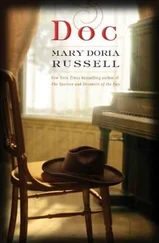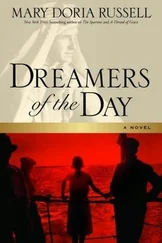“We’re not made of sugar— we won’t melt!” her father says with breathless cheer.
Santino sets the suitcases down and flexes his cramped fingers. Artillery, he thinks. Three minutes’ rest this time.
Far below, just east of town, Rivka Brössler sits alone, admiring a sunset made glorious by low clouds first gilded, then enameled with Fabergé colors. “The best view in Sainte-Gisèle!” her grandson Duno told her once. “Do you like it, Oma?” Rivka waved her hand, as though flicking at a fly. It was too much trouble to answer.
Not even the most charitable of her descendants ascribe her present state to age alone. True, she’s retreated from the world more decisively since the Brösslers left Vienna, but even as a young mother, Rivka always seemed distracted. Long ago, her family left the Ukraine for the opportunity and relative safety of Austria; they were better off, but something was always reminding Rivka of home.
Her youngest son, Herrmann, grew up in Vienna, embarrassed by his mother’s Slavic vowels and awkward syntax. Now, when she speaks at all, it is in Ukrainian, a language Herrmann never learned.
“She’s gone back to the Ukraine in her mind,” a doctor from Holland told the Brösslers. “Think of it! No one left alive who calls her by her first name. Such loneliness, to be only Mother, or Grandmother, or Frau Brössler, but never Rivka again. You are sad to see her this way, but she’s happy in her memories. Sit with her,” he advised. “Keep her company. Enjoy her contentment.”
Everyone thinks she’s senile, but Rivka knows she’s not. She’s tired, that’s all. Tired of Herrmann and Frieda quarreling, of the grandchildren making noise. Tired of new places, new languages. People coming and going, with their names and opinions and rules and demands. Life is one damned thing after another, Rivka decided when they left Austria behind. To hell with it.
Since moving to the Jewish nursing home last spring, Rivka has spent the greater part of every day sitting out on this arcaded wooden balcony waiting for the sunset. Tonight, the air is soft. The scent of roses rises from a nearby garden. Best of all, there’s a big storm coming. Rivka settles down happily, listening to booming thunder. She’s always enjoyed the drama of a nice storm.
She sneaks a look over her shoulder at the clock. It’s past time, but no one’s come to bully her into bed. Watching the lightning, she feels like a naughty child, thrilled to stay up late, and like a child, she falls asleep although she’d rather not. Memories blur into dreams, and back again. Who was that girl in the dream? Cousin Natasha! Now, what brought her to mind?
When Rivka wakes again, it’s to the sound of footsteps. She doesn’t see the soldier enter her room, her attention caught instead by the people running in the streets, just beneath her balcony. “Natasha, look!” she says, before she can stop herself. Now I really am senile! she thinks.
She smiles and shakes her head at her own foolishness, which spoils the soldier’s shot. “ Scheisse, ” he swears irritably. Averting his face from the fountaining blood, he presses the gun barrel to the old Jew’s skull, and finishes the job.
PORTO SANT’ANDREA
“Mamma,” Renzo Leoni calls, wincing at his own voice. “For God’s sake, get the door!”
He doesn’t expect a reply. She might be at the market, but it’s just as likely that his mother is sitting at the table, content to let him pay the price for last night’s binge.
“Signor Leoni!” the rabbi’s son yells again. “Are you awake yet? My babbo needs ten men for morning prayers, and I’m only seven, so I can’t, so you have to!”
“Your babbo can go to hell, and take the minyan with him,” Renzo mutters. He limps as quickly as he can through an apartment crammed with generations of dusty furniture. Piles of knitting and mending slump beside every chair. Books, cinema and fashion magazines, newspapers, and mail obscure every horizontal surface. Before the race laws, peasant girls helped with the endless heavy housework of middle-class families. Now most Jewish housewives struggle to maintain their prewar standards. Not Lidia Leoni. “It’s a political protest,” she says.
Before Renzo reaches the door, Angelo Soncini has banged on it three more times, kicking it once for good measure. “My mamma says she’ll make you breakfast! Signor Leoni, are you—”
“ Belandi, Angelo! Stop it! You’re killing me!” Renzo unlocks the door.
Angelo takes a step backward, staring.
“Inform your esteemed babbo,” Renzo tells the boy in a low and careful voice, “I’ll be there in twenty minutes, but this is absolutely the last time. Tell your beautiful mammina,” he adds with conviction, “that if I come within one hundred meters of food during the next three hours, we’ll all regret it.” Angelo looks blank. “No breakfast, thank you,” Renzo explains. “I’m not feeling entirely well.”
Angelo looks a bit stunned, but he nods gravely and takes off for home. Appalled by the amount of noise a small boy can generate during the simple act of descending a carpetless staircase, Renzo closes the door as quietly as he can and shuffles to the nearest chair.
Pretty girls and handsome women gaze at him in the dim, divided light of the shuttered salon. His mother’s apartment is his father’s Uffizi, its walls a gallery of family portraits, mute testimony to her late husband’s professional talent. Beautifully lit, cunningly composed, the largest photo was taken thirty years ago. Round-faced and chubby, the long-awaited son grins toothlessly on his triumphant mother’s lap. Around these two, the stair-step Leoni sisters are arrayed, elegant as Romanovs in white organdy, their hand-me-downs kept quietly stylish by their mother’s own clever fingers. Rachele, then eighteen and already engaged to Tranquillo Loeb, a successful attorney ten years her senior. At two-year intervals: Bianca, Elena, Debora, and Susanna, each slender and striking, with their mother’s aristocratic bearing and Torinese fairness. Then a sad gap: two miscarriages, both girls, and another daughter who died shortly after birth, followed by sturdy little Ester, four in the photo, a proprietary hand resting on her mother’s arm. And then? When hope had faded, a son and heir for the proud photographer: Renzo, himself. The little prince.
“Renzo flew before he could walk.” That’s the family legend, and it’s very nearly true. With six sisters to carry him like a doll, his feet rarely touched the ground before he was three, and his earliest memory is of sailing through the air.
It must have been spring, and close to sunset. A small boy awakens from an afternoon nap at his grandparents’ home. Downstairs: the high-pitched chatter and squeal of girls, their mother’s imperious orders mercifully muffled. Their father, silent, yearns for the peace of his darkroom, no doubt. The boy squirms onto a rush-bottomed chair in front of an open window. He is alone, and enchanted by a thousand swifts that soar and wheel just out of reach. Dark wings flash against a lavender sky. The birds plunge, disappearing. Sweep upward in tight formation. The rushes prickle his bare feet, so the boy levers himself onto the broad stuccoed windowsill. Squirming forward, he dangles breathlessly, head in the air, rump in the bedroom. The swifts dive again, and in a moment of toddler ecstasy, the boy hurls himself after them, arms wide as wings.
“His maiden flight,” Emanuele Leoni called it with perverse paternal pride, telling the story to anyone who’d listen and admire the plaster casts on his son’s little wrists.
His sisters watched young Renzo more carefully after that. Escaping their vigilance became part of the game. He did so with a fluid combination of bald-faced lies and physical daring, acquainted at an early age with Sant’Andrea’s crowded rooftops and sheer cliffsides. If a few weeks passed without his appearance in the emergency room of the local hospital, the white-clad nursing nuns telephoned to make sure Renzo hadn’t been killed. “You should enroll him in flying lessons,” one advised when Renzo turned fourteen. “Perhaps he’d learn to control his landings.”
Читать дальше












